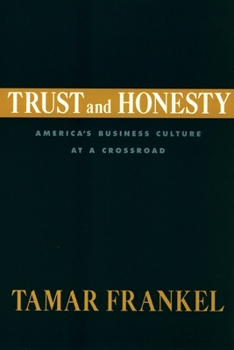Trust and Honesty: America's Business Culture at a Crossroad
Select Format
Select Condition 
Book Overview
America's culture is moving in a new and dangerous direction, as it becomes more accepting and tolerant of dishonesty and financial abuse. Tamar Frankel argues that this phenomenon is not new; in fact it has a specific traceable past. During the past thirty years temptations and opportunities to defraud have risen; legal, moral and theoretical barriers to abuse of trust have fallen. She goes on to suggest that fraud and the abuse of trust could...
Format:Paperback
Language:English
ISBN:0195371704
ISBN13:9780195371703
Release Date:August 2008
Publisher:Oxford University Press
Length:264 Pages
Weight:0.85 lbs.
Dimensions:0.7" x 6.0" x 9.1"
Customer Reviews
3 ratings
Trust
Published by Thriftbooks.com User , 17 years ago
Being a published author on trust myself, I looked forward to reading Professor Frankel's book with the utmost anticipation; and I must admit that the book did fully live upto it. Professor Frankel carefully studies the idea of investing in trust, monetizing it, and unfortunately because of some [...], cashing it in. She provides examples and also a very strong analytical framework for policy discussions. I personally found the book all the more insightful because of the high transaction costs imposed on society as a result of a decrease in a priori trust. All in all, a must read!
Brilliant and Well Written
Published by Thriftbooks.com User , 17 years ago
Professor Frankel is the undisputed leading authority on matters of fiduciary duty and trust in financial law. She applies these themes and principles to the broad topic of business and drives us to some fascinating and challenging conclusions. Any business executive, lawyer, accountant or finance executive who is in a leadership role should read this book and consider its conclusions carefully.
Business Ethics
Published by Thriftbooks.com User , 17 years ago
Frankel's book is thought-provoking and original. It raises issues that affect all of us. If we listen to TV or open the newspaper, almost every day we read about dishonesty and fraud. We must ask ourselves whether America has changed. Yet, it may well be that we always had such abuses, except that we now have more information about them. Frankel recognizes this point. Her argument is not that there is more fraud today, but that there are more acceptances, more widespread justifications and sometimes more legitimizing of fraud. And that she proves with meticulous research. But she does not stop here. Her next question is: how did this come about? And her short answer is: Temptations went up and barriers to fraud went down at the same time. As examples, she discusses corporations that "cooked the books," and the attitude of corporate management in the manipulation of its stock options. Barriers to such behavior have gone down as the importance of markets (protect yourself!) has risen. While morality (limit your own temptations!) and the law (enforcing social rules) have gone down. The last question of course is: If all this is true, how do you resolve it. The answer she gives focuses on culture, and when culture is involved there is no quick fix. That is because culture is a social habit - the assumption (without much thought) of how people will behave. Habit takes a long time to form and a long time to change. Change must occur first by recognizing that we have gotten into a bad habit. Frankel shows that a culture of dishonesty is costly. It undermines economic prosperity. As such, we must aim at a better habit and each of us must do something to change it, while leaders must lead the way. "If Americans have had enough of financial abuse, they can demand of their leaders, of themselves and of each other more honesty and trust and less cynicism....A society can have `bad apples' and may disagree about the precise meaning of trust and truth, yet such a society can remain honest, so long as it aspires to honesty." Is a change in corporate culture underway? A recent article in the Wall Street Journal describes three CEOs who now behave differently: They listen to others. They tolerate criticism. They are not in the news, focusing on the corporation rather than themselves. Could they be the new and future leaders of American business?





